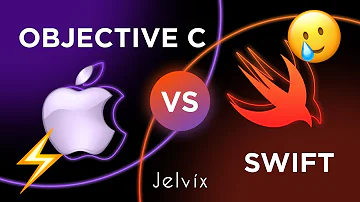Is Swift based on Objective-C
Swift is a relatively new programming language that was created by Apple employee Chris Lattner in 2010 and introduced to the public in 2014. It's an advancement of Objective-C, designed to make writing and maintaining code easier.
Is Swift built on top of Objective-C?
Launched by Apple in 2014, Swift emerged as an enhancement to its predecessor, Objective-C, a programming language integral to iOS development. As of iOS 7 and MacOS 10.9, Swift has been in continuous use for these products.
Cached

Is Swift based on C?
Swift is a successor to the C, C++, and Objective-C languages. It includes low-level primitives such as types, flow control, and operators. It also provides object-oriented features such as classes, protocols, and generics, giving Cocoa and Cocoa Touch developers the performance and power they demand.
Why did Swift replace Objective-C?
Objective-C is more prone to errors
The way Swift's syntax and language is constructed, it excludes several mistakes that are more likely to occur in Objective-C. This means that Swift is more immune to bugs and cases of unexpected functioning and crashes.
Is Objective-C still used in 2023?
In 2023, both Swift and Objective-C get a similar share of Google searches, though the newer language is somewhat more popular (2.28 % for Swift vs. 2.26% for Objective-C).
Can Swift replace Objective-C?
In most cases, Swift is a better choice over Objective-C for building iOS apps. Most – if not virtually all – new iOS apps are built using Swift.
Is Swift replacing Objective-C?
Apple positioned Swift as a replacement for Objective-C, its decades-old programming language for the company's software ecosystem.
Is Objective-C better than Swift?
Objective-C has a superior runtime compared to Swift. It's probably going to be several years before Swift can catch up. If you're using powerful SDKs, Objective-C is also your best option here as well. I'd still recommend that new developers start off learning Swift.
Is Objective-C harder than Swift?
For starters, Swift is easier to read and write than Objective-C. Swift also has a more concise syntax that makes it easier to understand code at a glance. In addition, Swift is more type-safe than Objective-C, meaning that it is less likely to produce unexpected results due to type mismatches.
Should I learn Objective-C or Swift 2023?
Objective-C is harder to learn.
It differs significantly from modern programming languages. For example, aspects like memory management are harder to grasp than with Swift. That makes it easier for beginners and Objective-C developers to learn Swift, as opposed to the other way around.
Is Objective-C still used for iOS?
While Apple still supports Objective C, there aren't any updates to the language on the horizon. This means Swift is not only a newer language that has useful features Objective C lacks, but it's also receiving updates from Apple.
Is Objective-C going away?
Even though the language won't see a sunset any time soon, it won't get any better either. If you want to start your career as an iOS developer, start by learning Swift. That said, don't write off Objective C all together. Many older iOS apps are built using Objective C.
Should I learn Objective-C before Swift?
Objective-C has a superior runtime compared to Swift. It's probably going to be several years before Swift can catch up. If you're using powerful SDKs, Objective-C is also your best option here as well. I'd still recommend that new developers start off learning Swift.
Is Objective-C still used by Apple?
While Apple still supports Objective C, there aren't any updates to the language on the horizon. This means Swift is not only a newer language that has useful features Objective C lacks, but it's also receiving updates from Apple.
Is Objective-C worth learning in 2023?
In 2023, both Swift and Objective-C get a similar share of Google searches, though the newer language is somewhat more popular (2.28 % for Swift vs. 2.26% for Objective-C).
